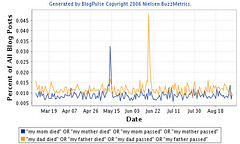I never thought about this before – perhaps because I’m in my thirties and both my parents are still alive, thankfully – but I just discovered through blog conversation analysis that Mothers Day and Fathers Day are the two days of the year with the highest frequency of references to deceased mothers and fathers, respectively.
In the Blopulse chart below, the blue trend line indicates the percentage of all blog posts over the past six months that include one of these phrases: “my mother died” or “my mom died” or “my mother passed” or “my mom passed”. The orange line indicates posts that include one these phrases: “my father died” or “my dad died” or “my father passed” or “my dad passed”. (Click on the image for a hi-res image.)
The concentration of references on May 14 and June 18 makes a lot of sense, but it puzzles me that there are 50 percent more references to dads versus moms. Are dads remembered more on Fathers Day versus moms on Mothers Day?
Of course, the answer to that question is complex, as individuals express remembrance and tribute to parents in numerous ways – online and offline. (Check out my earlier writing about the online mourning process here.) Regardless, this is strong evidence that children mourn deceased mothers and fathers in very different ways. (There also are obvious nuances in how parents mourn sons versus daughters.)
Click on this link to see conversations that drove the spike on Mothers Day, and this link for conversations driving the spike on Fathers Day. Some of them are pretty moving.
What do you think?
[Thanks to Stephen J. Dubner, co-author of Freakonomics, for linking here in his post about funeral attendance impacting productivity. Freakonomics is one of my favorite books, but the blog is even better because it’s living, engages the readers, fulfills my addiction to weird economic questions and tackles many feared realities of a society in denial. Check it out!)


You may want to look towards the respective life expectancies of men and women. Couple that data with the average age of members of the blogosphere. It is probably more likely that someone who has a blog has lost their father as opposed to their mother. I’m not saying that it accounts for the full fifty percent more posts about dads, but the contrast probably wouldn’t be so great if you controlled for these factors.
You may want to look towards the respective life expectancies of men and women. Couple that data with the average age of members of the blogosphere. It is probably more likely that someone who has a blog has lost their father as opposed to their mother. I’m not saying that it accounts for the full fifty percent more posts about dads, but the contrast probably wouldn’t be so great if you controlled for these factors.
You may want to look towards the respective life expectancies of men and women. Couple that data with the average age of members of the blogosphere. It is probably more likely that someone who has a blog has lost their father as opposed to their mother. I’m not saying that it accounts for the full fifty percent more posts about dads, but the contrast probably wouldn’t be so great if you controlled for these factors.
You may want to look towards the respective life expectancies of men and women. Couple that data with the average age of members of the blogosphere. It is probably more likely that someone who has a blog has lost their father as opposed to their mother. I’m not saying that it accounts for the full fifty percent more posts about dads, but the contrast probably wouldn’t be so great if you controlled for these factors.
Donald,
I was thinking that, too. Though I’m not intuitively familiar with life expectancies. But thanks for your comment and possible explanation…I’ll investigate further.
Max
Donald,
I was thinking that, too. Though I’m not intuitively familiar with life expectancies. But thanks for your comment and possible explanation…I’ll investigate further.
Max
My thinking is that bloggers (I assume) are mostly male and therefore the father -son bond is more influential in their lives and more blog-worthy
My thinking is that bloggers (I assume) are mostly male and therefore the father -son bond is more influential in their lives and more blog-worthy
I think it’s also possible that the way you gathered your data may not have necessarily been accurate; dad is spelt ‘dad’ throughout all english speaking countries. Mom, on the other hand, is contentious. At least in Australia it is frequently spelt mum. I don’t know how significant this would be though.
I think it’s also possible that the way you gathered your data may not have necessarily been accurate; dad is spelt ‘dad’ throughout all english speaking countries. Mom, on the other hand, is contentious. At least in Australia it is frequently spelt mum. I don’t know how significant this would be though.
I definately think Shulzi is on to something with the spelling of “mom”. In Australia, New Zealand, and most impactfully population wise, the UK, it’s spelt “mum”. Could be a simple matter of not capturing all the data rather than one or the other being remembered more.
I definately think Shulzi is on to something with the spelling of “mom”. In Australia, New Zealand, and most impactfully population wise, the UK, it’s spelt “mum”. Could be a simple matter of not capturing all the data rather than one or the other being remembered more.